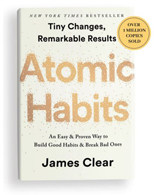I have a confession: I waited until the last minute to write this article. Not because it’s not important, and not because I’m a procrastinator (okay, maybe a little). Busy? Yes, I am busy, but not too busy to do this. Running out of things to say that are relevant or worrying that no one will enjoy what I’m putting out there may have had a teeny part in my excuse making. If I must be honest, and you know I am, the biggest reason is that I don’t view myself as a writer, so I struggle with prioritizing this task. I’ve written before about imposter syndrome, and this is along those lines. However, imposter syndrome can almost lead to a state of anxiety. This thing about not being a real writer is something slightly different.
In the last few weeks, I’ve been reading some interesting books, and I am currently enjoying Atomic Habits, by James Clear. Clear has become a master at creating lasting habits for himself and overcoming great odds by doing the little things that matter every day. He suggests that one of the reasons why we don’t have success in creating lasting habits is that we don’t identify ourselves as something. For example, are you a “runner” or are you buying new shoes, thinking about a running watch, trying to go for a run but the weather is bad? Are you “healthy” or are you trying to eat right but the fridge is just down the hall and you’re hungry and are carbs good or bad? You’re not sure so you’re going to just eat all of them? Are you a “good friend” or are you trying to make time but it’s cold out and you’re really tired and your schedule is jammed and on and on? Reframing how we view ourselves can be very powerful. If you start to define yourself the way you want to be, you can then set up systems to help you achieve that definition every day.
Are you a “great interviewer” or are you someone trying to do interviews? Are you a “loss prevention professional” or are you someone who catches bad guys? Finding the right definition for yourself and what it is that you want to achieve so that your goals and your daily systems align can make all the difference. Let me explain.
If you come into work every day and you define yourself as someone who tries to do interviews, are you really going to put as much effort into honing your craft as someone who already considers themselves a great interviewer? A person who is a great interviewer reads about this skill set, practices, and gets better because they want the way they are perceived to match their personal definition. Their daily systems of practicing and reading help support this definition. The same thing goes for a “loss prevention professional.” If that’s the way you view yourself, chances are that you will dress the part, act the part, and invest in yourself so that others view you the same way. Over time, this incremental investment adds up to create someone who really is a great interviewer or a loss prevention professional. Clear refers to this as “positive compounding”—small habits are done continually over time to build a positive outcome.
Here’s another example of reframing. If you have been struggling to quit smoking, changing your personal definition to “nonsmoker” will help you to make the right choices daily. A nonsmoker doesn’t buy cigarettes; a nonsmoker doesn’t hang out in the smoking area; and a nonsmoker gets rid of all smoking paraphernalia because they don’t need it. Do this every day and be this way every day and you truly are a “nonsmoker.”
So, do I start to view myself as a writer so that I can get this article done on time? Hmm, that seems like what James Clear would suggest, but the struggle is real for me. If I start to reframe my personal definition, will imposter syndrome kick in? Ugh, let’s hope not. Maybe for the purposes of the task at hand we can temporality change our frame of mind, because no one is 100 percent this or that. We all wear many hats, and we just need to pull the right one off the hook to use. Today I’m wearing my writer hat. In order to reframe this so that it becomes my personal definition, I need to do what writers do. Write, every darn day. (Note to self—emails don’t count.)

If you are trying to get into some good habits or change some things in your life, grab a copy of Atomic Habits. It’s worth the investment, and as a loss prevention professional or great interviewer, you will definitely find takeaways that will add to your positive compounding.





